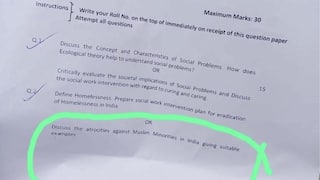FSSAI Releases Comprehensive Standards For Identification Of Basmati Rice
These standards, which have been notified, will be effective from August this year.

New Delhi: Food regulator FSSAI for the first time has come out with comprehensive standards for the identification of basmati rice as part of efforts to ensure fair trade practices and check adulteration. Basmati rice should have the natural fragrance characteristics of basmati rice and there should be no artificial colouring, polishing agents and artificial fragrances.
These standards, which have been notified, will be effective from August this year.
"For the first time in the country, Food Safety and Standards Authority of India (FSSAI) has specified the identity standards for basmati rice...," the Health Ministry said in a statement.
Basmati rice includes brown basmati rice, milled basmati rice, parboiled brown basmati rice and milled parboiled basmati rice.
The FSSAI has come out with these standards through Food Safety and Standards (Food Products Standards and Food Additives) First Amendment Regulations, 2023 notified in the Gazette of India.
"As per these standards, basmati rice shall possess natural fragrance characteristics of basmati rice and be free from artificial colouring, polishing agents and artificial fragrances," the statement said.
These standards also specify various identity and quality parameters for basmati rice such as the average size of grains and their elongation ratio after cooking.
These norms also state maximum limits of moisture, amylose content, uric acid, defective/damaged grains and incidental presence of other non-basmati rice etc.
"The standards are aimed at establishing fair practices in the trade of basmati rice and protect consumer interest, both domestically and globally," the ministry said.
These standards will be enforced with effect from 1st August 2023.
Basmati rice is a premium variety of rice cultivated in the Himalayan foothills of the Indian sub-continent and is universally known for its long grain size, fluffy texture and unique inherent aroma and flavour, the ministry highlighted.
Agro-climatic conditions of the specific geographical areas where basmati rice is grown; as well as the method of harvesting, processing and ageing of the rice contributes to the uniqueness of basmati rice.
Due to its unique quality attributes, basmati is a widely consumed variety of rice both domestically and globally.
India accounts for two thirds of its global supply, the statement said.
Being a premium quality rice and fetching a price higher than the non-basmati varieties, the ministry said that the basmati rice is prone to various types of adulteration for economic gains which may include, among others, undeclared blending of other non-basmati varieties of rice.
"Therefore, in order to ensure supply of standardised genuine basmati rice in domestic and export markets, FSSAI has notified regulatory standards for basmati rice that have been framed through extensive consultations with the concerned government departments / agencies and other stakeholders as well."
(This report has been published as part of the auto-generated syndicate wire feed. No editing has been done in the headline or the body by ABP Live.)
Check out below Health Tools-
Calculate Your Body Mass Index ( BMI )






































